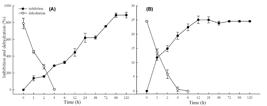ABSTRACT:
Carex physodes is an ephemeral species in the cold desert of Gurbantunggut in Northwest China. It has both asexual and sexual reproductive patterns. The primary aims of this study were to characterize the reproduction systems and identify the role of fruit dispersal in the sexual reproduction of C. physodes. Aboveground and underground biomass, root-shoot ratio, inflorescence biomass, fruit-set of C. physodes were measured and dispersal of perigynia and achenes in the natural habitat and indoor condition were studied. The underground biomass of C. physodes was approximately 10 times more than the aboveground biomass. The most parts of aboveground biomass is allocated to the inflorescence, which suggests that C. physodes allocates most biomass to the reproductive part. C. physodes produces perigynium with a pericarp containing one achene. The perigynia disperse at a much greater distance than achenes at both 1 and 4 m s-1 wind velocity, and the floating time of perigynia in water was much longer than that of achenes. Perigynia can hold more water and adher soil much more easily than achenes, which suggests that perigynia are suitable for wind dispersal, and they also adapt to spread at a long distance by occasionally rainfall. However, achenes may remain near the mother plants and only disperse at short distances. C. physodes is morphologically and physiologically adapted to the cold desert environment via a combination of characters associated with the rhizomatous and perigynium. This adaption may increase the opportunity of survival and expansion of population of C. physodes.
Keywords:
Carex physodes; reproduction; dispersal pattern; perigynium

 Thumbnail
Thumbnail
 Thumbnail
Thumbnail
 Thumbnail
Thumbnail


